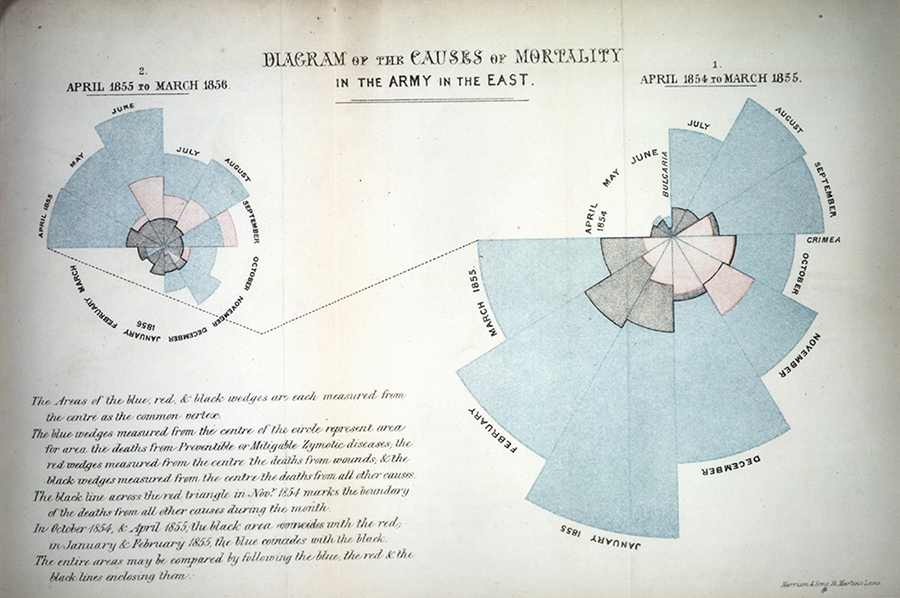Miller (2011, p20) describes how databases are the source of much digital information and their ability to pull together data from many datasets allows the creation of something unique. Unique, rather than original; the information set matches the specific requirements of the individual but is created out of existing data.
But data was used long before the structured datasets that drive today’s information society. Several of the exhibits in the Big Bang Data Exhibition examine the role of data in improving health. Nurse, Florence Nightingale (1858) was a data pioneer, using data visualisation to show how many deaths amongst soldiers were the result, not of war wounds, but of sickness thus making her case for better nursing.
Data has a strong role to play in health today, according to NESTA’s John Loder, (2016) the amount of data we collect about ourselves – from smartphones, fitbits and health records – will help medical experts understand individual reactions to treatment, which can vary widely, thus creating a unique response to an illness or condition.
The sheer volume of data generated is demonstrated in the London Situation Room, which uses data for and by Londoners to give a sense of ‘the pulse’ of the city. Creative Producer, Ana Tiquia (2016) explains that the room was created to give Londoners the chance to explore the data, to ask what kind of stories they could tell and what the data tells us about how we live. One of the exhibits, Future Cities Catapult, gives visitors the chance to use data modeling techniques to make decisions on how the London of 2036 will look.
But while the gathering and usage of data offers many benefits, it is not without its downside as filmmaker Laura Poitras’s shows in her profile of NSA whistleblower William Binney, who – long before Snowden – revealed the US government’s top-secret programme to collect the personal data of US citizens, raising questions about privacy and surveillance.
NSA Whistleblower, William Binney, talks at the CIJ Summer School 2014
References
CIJ Summer School (2014). NSA Whistleblower, William Binney. Interview. http://tcij.org/node/1040 [Accessed 22 February 2016]
Future Cities Catapult (2016). Exhibit http://bigbangdata.somersethouse.org.uk/artist/future-cities-catapult/ [Accessed 22 February 2016]
Loder, J (2016) Interview. http://bigbangdata.somersethouse.org.uk/how-can-data-improve-our-health/ [Accessed 22 February 2016]
Miller, V. (2011). Understanding Digital Culture, p20. Sage.
Nightingale, F. (1858). Notes on Matters Affecting the Health, Efficiency and Hospital Administration of British Army
Poitrs, L. (2016). Interview. http://bigbangdata.somersethouse.org.uk/how-far-will-a-government-go-to-track-us/ [Accessed 22 February 2016]
Tiquia, A. (2016) Interview. http://bigbangdata.somersethouse.org.uk/who-controls-our-data-usman-haque-debates-the-implications-of-the-data-explosion/ [Accessed 22 February 2016]

